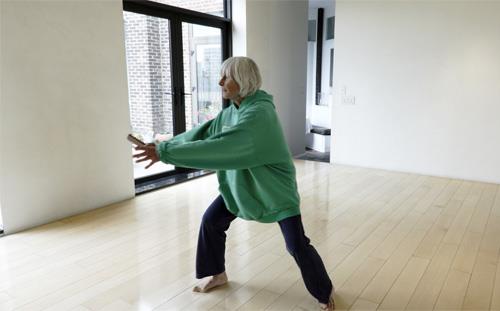
Twyla Tharp's life has covered much of the dance universe.
It's involved Broadway and ballet, Beethoven and Baryshnikov, and The Beach Boys. It's included one movie (Hair) that rippled with dance and another (I'll Do Anything) that cut every dance scene.
"It's a wildly, wildly diverse, unbelievable career," Steven Cantor, whose American Masters profile, titled "Twyla Moves," airs at 9 p.m. ET Friday (March 26) on PBS (check local listings), told the Television Critics Association (TCA).
And it keeps going. Tharp turns 80 on July 1; the film bounces between being a biography and showing her choreographing a still-pending video project, sometimes demonstrating dance moves. Every morning, she told the TCA, she'll "try to get in here by 6:30 and get the body lumbering."
Her body has stayed flexible, and so has her mind. "My mother is responsible for my range of thinking."
But give her surroundings some of the credit, too: Tharp was born on a farm in Portland, Ind., and spent some summer months with her Quaker grandparents in Indiana. This was similar to other expansive childhoods – Cole Porter on an Indiana farm (later writing Don't Fence Me In) or Frank Lloyd Wright spending summers on a Wisconsin farm with his Unitarian aunts.
"On the Indiana farm, it was about space," Tharp said. "It was about nature. It was about things so much larger than you are."
When she was 8, her family moved to Rialto, Cal. There, it had an auto dealership and a drive-in theater (along the famed Route 66), where Tharp worked. "The drive-in was about audiences . . .. It was about pulling in ticket-buyers and understanding what would motivate them."
Nudging her was her mother. From age 2, Tharp was "going through baton, tap, Gypsy, German." She even studied shorthand, she said; it can "take the brain to a greater open expanse."
There were concerts and classes. Beatrice Collenette – a top protégée of Anna Pavlova – had moved to Pasadena. Each weekend, Tharp and her mother made the drive to Ms. Collenette (an hour each way) for a lesson.
Tharp went to nearby Pomona College but then headed to New York – graduating from Barnard in 1963. "I was incredibly lucky," she said. "I came to New York at a time when George Balanchine's company was at its apex, when Merce Cunningham's company was" strong. She was able "to work in the same room as Martha (Graham) and Merce and Paul (Taylor)."
Still, she also had her own style. She rented a dance loft for $50 a month, formed a five-woman company, and did free concerts in the park. For five years, she did dances without music.
After a brief, rural interlude of marriage and giving birth to a baby boy, Tharp returned and was ready to draw paying audiences. She got a distinctive Vidal Sassoon hairstyle and became a noted part of New York's arts scene. Soon, she was merging modern dance and ballet.
After all those no-music years, Tharp went in the opposite direction. "I've done a lot of Beethoven pieces," she said. She did a Sinatra show and what were called "crossover ballets" – a 1973 Joffrey Ballet show done to Beach Boys music and a '76 Broadway show with Mikhail Baryshnikov.
On Broadway, Tharp did three productions with her own company and four other shows, including ones based on the music of Billy Joel (winning a Tony in 2003) and Bob Dylan.
She also choreographed five movies. Three, starting with Hair (1979), were directed by Milos Forman. "Milos had a deep musical background …. And he had seen how you could transfer everyday movement into a fantasy world."
The opposite came when James L. Brooks – wildly successful with TV (Taxi, Simpsons) and movies (Terms of Endearment) – wrote I'll Do Anything (1994) as a musical.
"I said, 'I'll make dances, but I don't think it's a musical,'" Tharp said. He later agreed, stripping out all the music moments. "We shot some great scenes," she said. "I have them in the archive."
There's a lot else there, apparently. "She has an incredibly well-organized archive," Cantor said.
It's important to be organized if your work is far-flung and your personality is, well, unique.
Tharp recalls the time that her physical trainer mentioned that she swears a lot. "My son said to him, 'Well, you know, she's only half-civilized. She's half-feral.'"
But the civilized half is well-organized.